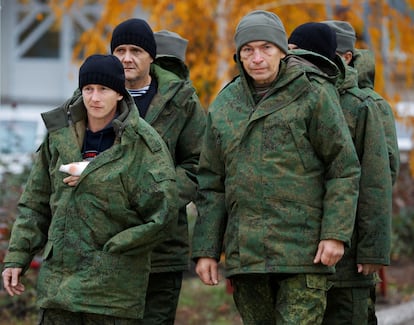Three uncomfortable testimonies from Ukrainians who fought with the Russians: ‘I want them to exchange me for prisoners’
The Kyiv government organized a meeting with four prisoners of war, three of them from the occupied regions of Donetsk and Luhansk

The first thing the event moderators ask is that journalists turn off their cameras and that they do not ask insulting questions because they may contravene the Geneva Convention. In front of them are four prisoners of war from the Russian Army. The Convention establishes that prisoners should not suffer public humiliation, something that has occurred on both sides of the conflict and that the United Nations denounced in a report last March. The press center in Kyiv is unusually full. This is a special event: of the four enemy combatants arrested, three are Ukrainians, from the territories of Donetsk and Luhansk, which unilaterally separated from Ukraine in 2014 and were illegally annexed by Russia in 2022.
The Ukrainian Ministry of Defense organized a meeting last Friday to demonstrate that Kyiv provides Russian prisoners of war with dignified treatment in accordance with the international obligations of the Geneva Convention. The ministry representatives stressed that Ukraine, unlike the invader, complied with these standards. The four prisoners appeared with serious expressions and dressed in their military uniforms. All wore boots, except Eugene, a 23-year-old from Donetsk, who wore sandals. While the rest told their stories with difficulty and were emotional at times, Eugene, the most talkative of the group, muttered the memorized words that he would contribute to his case. According to him, most of those who appear at these events are Ukrainians because Russian prisoners prefer not to speak in public so as not to suffer reprisals when they return home.
The four had words of praise for the Ukrainian military units that captured them. There was no ill-treatment, according to their testimonies. In three of the cases, the soldiers were wounded and were immediately evacuated for hospitalization. The only one of the four of Russian origin was a 59-year-old man from Vladikavkaz, in North Ossetia. He had been a prisoner in Russia, convicted, according to his statements, for instigating public uprisings. Representatives of the Russian Ministry of Defense forced him to accept a contract with the army to fight in Ukraine. His role at the front, he claimed, was to dig trenches.
The Ukrainian media had no questions for him: their interest focused on Sergei and Nikita, two former compatriots who admitted wanting to be exchanged in order to return to the occupied territories. While Sergei was speaking, two Ukrainian journalists sitting behind our correspondent tried to hide their tears.
Sergei is from Mariupol, the city in Donetsk that was devastated in the Russian siege in the spring of 2022. For a year he tried to make a living as a bricklayer, in Russian reconstruction projects in the city. He didn’t even have enough to eat, he said. He saw an advertisement to enlist in the Russian Army in which they offered a salary of 240,000 rubles per month — $2,616. They promised him that he would serve in the rear, but last June he was sent to the front, where he was wounded and imprisoned. “I apologize for what I have done,” Sergei said. “I want to be exchanged for Azov prisoners,” he added, referring to the soldiers of the Azov battalion who held out until the very end of the siege of Mariupol.
The journalists repeated the same question to Sergei: why do you want to return to the occupied territories? His answer was always the same: because he has had Russian (as well as Ukrainian) citizenship since Mariupol was invaded and because he wanted to go back to where his relatives are. The same thing happened with Nikita, a 22-year-old from the city of Luhansk. He enlisted in the army of the Luhansk People’s Republic — a territory that unilaterally separated from Ukraine with Russian support in 2014 — before the full-scale invasion of 2022. He was captured in early 2023, returned to Luhansk in a prisoner swap and, he claims, was forced to return to the fighting. Seriously wounded, he was arrested a second time. Now, he says, he wants to be exchanged again to return to Luhansk and not return to the front.
Advantages over those arrested by Moscow
Petro Yatsenko, who coordinates the care system for prisoners of war, listed the advantages enjoyed by Russian prisoners compared to Ukrainian soldiers in the hands of the invading army: they are interned in detention centers far from combat zones, they are free to work or not, they have hours of daily rest, they can communicate with their families, they eat three times a day with good quality food and they have spaces for prayer, both for Christians and Muslims. Sunday is their day off and they can take advantage of it to play soccer.
Neither Ukraine nor Russia provide figures for the number of prisoners they have because revealing this data would harm their position in the negotiations for the exchange of captives that they carry out through third countries, as explained by Lieutenant Andrii Yusov, representative of the intelligence services of the Ministry of Defence. According to the Kyiv government, so far there have been 48 prisoner exchanges that have allowed 2,598 Ukrainian fighters in Russian jails to return to their homes.
Yatsenko stressed that the Red Cross regularly visits the prisoners in Ukraine’s main prisoner of war detention center in Lviv. The United Nations Human Rights Monitoring Mission in Ukraine (HRMMU), responsible for the report on mistreatment of prisoners on both sides, recognized that there is a greater willingness to cooperate with international organizations on the Ukrainian side than on the Russian side. Despite this, the HRMMU document severely criticized the Ukrainian Armed Forces, whom it also accused of multiple war crimes against Russian prisoners at the time of surrender and during interrogations in the days after. “The UN report was unbalanced because while we allow access to the prisoners [to be interviewed], Russia does not allow it,” Yatsenko said: “They have seen it, they have changed it, and we hope the next report will be fairer.”
Facing Sergei and Nikita are accusations of treason, attacking Ukrainian sovereignty and belonging to paramilitary groups, each of which carry sentences decades long. This is not the case with Eugene. This young man was forced by the Russian security services (FSB) to enlist and go to the front after it was discovered that he managed a telegram account opposing Vladimir Putin’s regime. In one of the first combat actions, he deserted by running 400 meters while waving a white shirt so that a Ukrainian drone could identify that he wanted to surrender. According to Yusov, 20% of captured enemy fighters desert in order to surrender.
Putin supporters in Donbas
Sergei and Nikita pointed out that the majority of the population in the occupied Donbas region support Russia. “Among older people, it may be 90%, because they see Putin as the continuation of the greatness of the Soviet Union,” Sergei said. He explains that among young people, few want war because the conflict in the Donbas had stagnated and a certain normality had returned, although the majority, he noted, are afraid of the Ukrainian authorities. Nikita confirmed that his group of friends in Luhansk believes less and less in Russian politics, but still fears a Ukrainian liberation.
“Russian propaganda says that they are Nazis, fascists, that they want to destroy us, and before February 24 [2022, when Russia began the full-scale invasion of Ukraine], the propaganda warned us that the Ukrainians wanted to invade the Donetsk and Luhansk regions, and it was a lie.” Sergei’s words were received with a heavy silence. A Ukrainian military action in Donetsk and Luhansk could not be considered an invasion, since these provinces are recognized as part of Ukraine’s sovereign territory by the United Nations and practically every country in the world.
Nikita and Eugene were asked when what they described as “brainwashing” against their country began. Both agreed that it was at school, in 2014. Sergei vividly remembered his school principal, a history teacher who fought in the war in Donbas and returned full of hatred toward Ukraine. Eugene, unlike his colleagues, has no intention of returning to the occupied Donbas, among other reasons, because the Russians have filed charges against him.
Sign up for our weekly newsletter to get more English-language news coverage from EL PAÍS USA Edition
Tu suscripción se está usando en otro dispositivo
¿Quieres añadir otro usuario a tu suscripción?
Si continúas leyendo en este dispositivo, no se podrá leer en el otro.
FlechaTu suscripción se está usando en otro dispositivo y solo puedes acceder a EL PAÍS desde un dispositivo a la vez.
Si quieres compartir tu cuenta, cambia tu suscripción a la modalidad Premium, así podrás añadir otro usuario. Cada uno accederá con su propia cuenta de email, lo que os permitirá personalizar vuestra experiencia en EL PAÍS.
¿Tienes una suscripción de empresa? Accede aquí para contratar más cuentas.
En el caso de no saber quién está usando tu cuenta, te recomendamos cambiar tu contraseña aquí.
Si decides continuar compartiendo tu cuenta, este mensaje se mostrará en tu dispositivo y en el de la otra persona que está usando tu cuenta de forma indefinida, afectando a tu experiencia de lectura. Puedes consultar aquí los términos y condiciones de la suscripción digital.









































